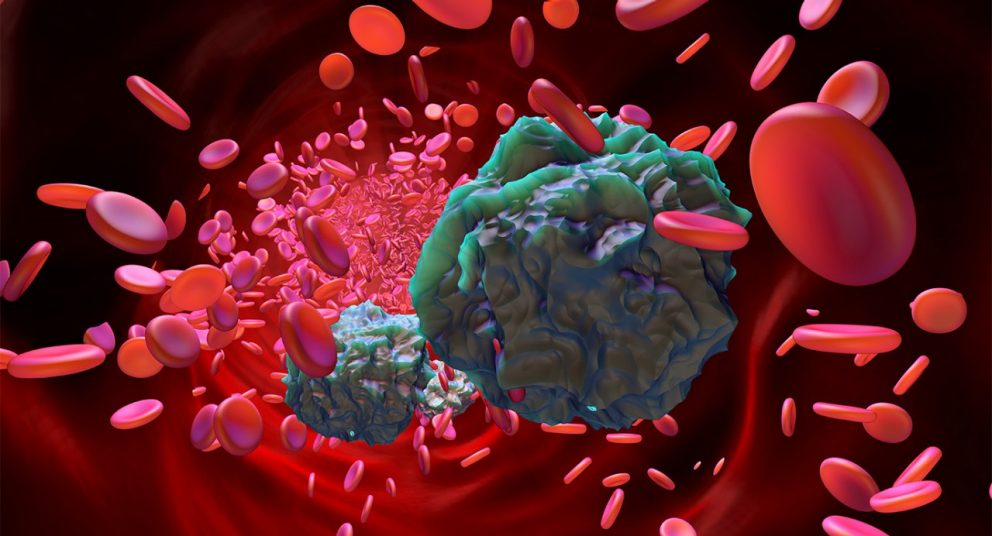The University of Texas MD Anderson Cancer Center was awarded more than $5.7 million in grants from Break Through Cancer to support collaborative research teams working to discover novel molecular targets to eradicate minimal residual disease in acute myeloid leukemia (AML) and to treat clonal hematopoiesis, a precursor to AML.
MD Anderson received $2.7 million to fund research for the Targeting Clonal Hematopoiesis to Prevent AML TeamLab and $3 million for the Eradicating Minimal Residual Disease in AML TeamLab. The projects expand upon work initiated within MD Anderson's Myelodysplastic Syndromes and Acute Myeloid Leukemia Moon Shot®.
This funding is part of $20 million in grants awarded to the five cancer centers that comprise Break Through Cancer: MD Anderson, Dana-Farber Cancer Institute, The Sidney Kimmel Comprehensive Cancer Center at Johns Hopkins, Memorial Sloan Kettering Cancer Center, and Koch Institute for Integrative Cancer Research at MIT.
"Collaborative team research and the integration of expertise across disciplines is central to our approach at MD Anderson, and we are proud to work together across institutions to accelerate progress," said Giulio Draetta, M.D., Ph.D., chief scientific officer at MD Anderson. "We are grateful to Break Through Cancer for supporting this important work, and we look forward to breakthroughs that can improve the lives of patients with AML."
Draetta and David Jaffray, Ph.D., chief technology and digital officer at MD Anderson, serve as members of the Break Through Cancer Board of Directors.
The Break Through Cancer TeamLab model encourages and enables collaboration in order to look beyond conventional therapies, to develop new strategies and thinking to address challenges in cancer treatment, and to pave the way for faster discoveries. The model allows researchers to work collaboratively in real time using new technology and systems to reduce barriers that often impact cross-institutional collaboration.
The projects and faculty researchers from MD Anderson include:
- Eradicating Minimal Residual Disease in AML - Researchers will investigate the mechanisms contributing to persistent residual disease after treatment and develop novel tools for detecting, targeting and treating residual AML. Contributing MD Anderson faculty researchers include: Michael Andreef, M.D., Ph.D; Pavan Bachireddy, M.D.; Jared Burks, Ph.D.; Naval Daver, M.D.; Ghayas Issa, M.D.; Priya Koppikar, Ph.D.; Jeffrey Molldrem, M.D.; Muharrem Muftuoglu, M.D.; Keyur Patel, M.D., Ph.D.; Farhad Ravandi, M.D.; and Nicholas Short, M.D.
- Targeting Clonal Hematopoiesis to Prevent AML - For the early detection and treatment of clonal hematopoiesis, a pre-malignant state for AML, the team will pursue novel strategies and pathways in high-risk patients. Participating MD Anderson faculty researchers include: Pavan Bachireddy, M.D.; Ken Chen, Ph.D.; Kelly Chien, M.D.; Simona Colla, Ph.D.; Courtney DiNardo, M.D.; Guillermo Garcia-Manero, M.D.; Danielle Hammond, M.D.; Jeffrey Molldrem, M.D.; and Koichi Takahashi, M.D., Ph.D.
"While targeted therapies can produce dramatic responses when used in some patients with AML, standard treatments have changed little in more than 40 years," said Jeffrey Molldrem, M.D., chair of Hematopoietic Biology and Malignancy at MD Anderson. "Two major roadblocks to improving patient outcomes are the failure of current therapies to eliminate minimal residual disease cells that have developed resistance and the lack of effective strategies to prevent the evolution of clonal hematopoiesis to AML. Gathering the top laboratory and clinical researchers at five leading institutions into focused TeamLabs will enable breakthrough discoveries that hold the promise of establishing new principles and therapeutics for our patients."
In 2022, MD Anderson was awarded more than $10 million from Break Through Cancer to support research projects focused on pancreatic cancer, ovarian cancer and glioblastoma. Break Through Cancer launched in 2021 with the aim of bringing together the nation's top cancer research institutions to find new solutions to some of cancer research's biggest challenges.







